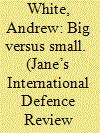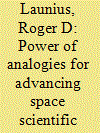|
|
|
Sort Order |
|
|
|
Items / Page
|
|
|
|
|
|
|
| Srl | Item |
| 1 |
ID:
136393


|
|
|
|
|
| Summary/Abstract |
As companies and governmental organizations seek a more affordable foothold in the small-satellite sector Andrew White studies now this technology is being used and the implications for a already cluttered environment
|
|
|
|
|
|
|
|
|
|
|
|
|
|
|
|
| 2 |
ID:
136923


|
|
|
|
|
| Summary/Abstract |
The authors survey the composition and principal design features of present-day and next-generation integrated communications and data transfer system (ICDTS) of the North Atlantic Treaty Organization’s leading countries. They examine the ICDTS structure from the viewpoint of platform environments ground, airspace, and outer space to deploy communications equipment and systems. Finally, the authors provide a glimpse into basic ICDTS development up to 2025.
|
|
|
|
|
|
|
|
|
|
|
|
|
|
|
|
| 3 |
ID:
135160


|
|
|
|
|
| Summary/Abstract |
It is a truism that every person in every organization ever created uses history to make decisions on a daily basis. This is essentially accomplished through the use of analogy, suggesting that some issue under current scrutiny is like, may be compared to, or otherwise is related to some historical example. Understanding what happened in those past, analogous instances therefore serves a valuable purpose in considering what to do in the present. The difficulties of analogs, however, are that they are routinely poorly applied to considerations of policies, priorities, and decision making which might effectively be informed by careful analog studies. Unfortunately, most uses of historical understanding are implicit, relying on personal anecdotes and employing faulty logic in the comparison. We have certainly seen this in the context of issues concerning the exploration of the space frontier since virtually the beginning of the space age. These range from analogs comparing modern cruise ship vacations and future space tourism to using the space race between the United States and the Soviet Union of the 1960s as an analog to predict a similar space race between the United States and China.
|
|
|
|
|
|
|
|
|
|
|
|
|
|
|
|
| 4 |
ID:
135628


|
|
|
|
|
| Summary/Abstract |
In a triumph for India’s scientific community last month, the Indian Space Research Organisation’s (ISRO) Mars Orbiter spacecraft was successfully put into orbit around the Red planet. India’s success in getting a spacecraft to successfully orbit Mars in its maiden effort, makes it the first country in the world to achieve this distinction. ISRO has become the first space organisation in Asia and only the fourth in the world to have successfully inserted a spacecraft into Mars orbit.
|
|
|
|
|
|
|
|
|
|
|
|
|
|
|
|
| 5 |
ID:
136883


|
|
|
|
|
| Summary/Abstract |
I am sympathetic to the view that, given the likelihood of massive natural disasters, such as collisions between the Earth and large asteroids, we should engage in large-scale space exploration and colonization so as to hedge our bets against extinction. I will consider several criticisms of this view. For example, some philosophers may raise objections against the notion of long-term human survival as a value. How can we have obligations towards beings who have not even been conceived yet and thus cannot be properly said to have rights? On a different note, Wendell Berry argues that the abundance of resources in space will produce bad character, for good character requires the discipline of finitude. Others challenge the connection between space exploration and survival, for they fear that by entertaining the promise of new Earths in the heavens we are more likely to neglect our planet, thus leading to our downfall. Presumably, we should instead increase our efforts to restore and preserve the balance of nature. I will advance a variety of replies. For example, we do decide for posterity to a great extent. We may plant the trees from which “our” descendants will receive nourishment and shade, or we may destroy what could have given them a fighting chance against drought and famine. We have an obligation not to plant a bomb that will go off two years from now in a hospital nursery, and another to ensure that the buildup of chemicals in the hospital water tank will not reach critical mass and kill most of the newborns in ten years. The “balance of nature” involved in another objection is a myth that cannot be justified by natural history, whether astronomical or biological. Moreover, the inevitable changes in the environment, independent of asteroid impacts, will make the Earth uninhabitable in a few hundreds of millions and years. In addition, in order to act wisely we need an understanding of the Earth as a planet, and this requires the exploration of space.
|
|
|
|
|
|
|
|
|
|
|
|
|
|
|
|
| 6 |
ID:
135159


|
|
|
|
|
| Summary/Abstract |
This report surveys the principal space events of 2013 and analyzes the central trends that can be discerned in government space activities in nations around the world. The article refers to cooperation between countries, to trends in space security, and reviews the space policies and activities of the leading nations as well as emerging ones. The proportion of government funds has declined in recent years; at the same time, space is one of the fields in which commercial endeavors are closely tied with government activities, and is strongly affected by the dynamics and politics between nations. The international community is struggling over the nature of activities in space, world leadership, and what should be permitted and what should be prohibited. Alongside this struggle for control and influence, many nations have come to understand that challenges and threats exist which require cooperation to address adequately. The concern is that, in the absence of appropriate action, use of space will be denied to all. The principal challenge facing the international community is to find a way to surmount obstacles to cooperation. Accordingly, follow-up and analysis of the interests, goals, and conflicts between the nations that are formulating the priorities and making the decisions about space are essential for understanding the direction in which developments in space are headed. They are also indispensable in creating a sustainable space industry.
|
|
|
|
|
|
|
|
|
|
|
|
|
|
|
|
|
|
|
|
|